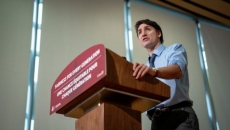A Canadian man killed along with six other aid workers in the Gaza Strip on Monday is a military veteran from Quebec who leaves behind a partner and a one-year-old son.
Jacob Flickinger, 33, was one of seven people in a convoy of World Central Kitchen vehicles when it was hit by an Israeli airstrike in what Prime Minister Benjamin Netanyahu has described as a tragic mistake.
Flickinger's father, John, said in a Facebook post that his son's death is a "heartbreaking tragedy" but that he died doing what he loved.
"My son, Jacob, was killed Monday delivering food aid to starving families in Gaza," John Flickinger wrote.
"He died doing what he loved and serving others through his work with the World Central Kitchen."
Israel deeply regrets the tragic incident which claimed the lives of seven humanitarian aid workers.
— Benjamin Netanyahu - בנימין נתניהו (@netanyahu) April 2, 2024
Our hearts go out to their families and to their home countries.
The IDF is conducting a swift and transparent investigation and we will make our findings public.
Israel…
I am outraged and heartbroken by the deaths of seven humanitarian workers from World Central Kitchen, including one American, in Gaza yesterday.
— President Biden (@POTUS) April 3, 2024
Incidents like yesterday’s simply should not happen.
Here is my full statement. pic.twitter.com/Nl2jq8wqTt
Flickinger was a dual Canadian and U.S. citizen. The Canadian Armed Forces confirmed Wednesday that Flickinger served in the Canadian military as an infantryman in Quebec’s Royal 22e Regiment.
A Go Fund Me page has been started to raise funds for a funeral and a trust fund for Flickinger's son. More than $14,000 had already been raised by mid-afternoon Wednesday.
The page says Flickinger had been working for World Central Kitchen in Gaza since early March.
“These are the heroes of WCK. These 7 beautiful souls were killed by the IDF in a strike as they were returning from a full day's mission. Their smiles, laughter, and voices are forever embedded in our memories.” - Erin Gore, CEO. Read more: https://t.co/4f38RQ1l4I pic.twitter.com/neAsSzKVP5
— World Central Kitchen (@WCKitchen) April 2, 2024
Last fall, he travelled with the charity to Acapulco, Mexico, to provide food aid after Hurricane Otis slammed into Mexico's Pacific coast.
The organization Restaurantes en Acapulco changed their main Facebook photo to feature a picture of Flickinger, clad in a World Central Kitchen T-shirt and sunglasses, walking down a street with another aid worker.
In a separate video posted on their feed, Flickinger is stopped by a local while handing out bottled water. He smiles and listens to the man talk for a short time before shaking his hand and thanking him.
Also killed in Monday's airstrike were Lalzawmi (Zomi) Frankcom, 43, from Australia, who shared a video less than a week before she died working at the warehouse near where the convoy was hit.
Polish national Damian Sobol, 35, began volunteering for aid groups when his hometown of Przemysl became a haven for refugees fleeing Russia's bombing in Ukraine.
Palestinian Saifeddin Issam Ayad Abutaha, 25, was working for the charity as a driver.
There were also three British military veterans killed, all providing security to to the team, including John Chapman, 57, James Henderson, 33, and James Kirby, 47.
They were in a convoy of three vehicles leaving a warehouse in Deir al-balah in central Gaza, after delivering more than 100 tonnes of food. The aid was about one-quarter of a delivery that arrived in Gaza at a makeshift pier built by World Central Kitchen out of the rubble left by earlier airstrikes around Gaza.
World Central Kitchen in mid-March became the first aid organization to get supplies in by sea to Gaza in more than two decades. Monday's delivery was part of the second sea shipment that came from Cyprus. It included rice, pasta, flour, legumes, canned vegetables, and proteins as well as a special shipment of dates.
The dates, provided by the United Arab Emirates, were "to provide a sense of comfort to Palestinians observing Ramadan during the darkest times imaginable," World Central Kitchen said on its website.
"Dates are traditionally eaten to break the daily fast."
The jetty was built with Israel's permission and the convoy's movements were reported to Israel ahead of time, the organization said.
Israel has some explaining to do about how the convoy ended up as a target, Prime Minister Justin Trudeau said Wednesday. Netanyahu has called the targeting inadvertent — something that "happens in war," he said.
"The world needs very clear answers as to how this happened," Trudeau said.
Foreign Affairs Minister Mélanie Joly, who is in Belgium attending a NATO foreign ministers meeting, said she spoke to Israeli foreign minister Israel Katz on Tuesday night.
"We're calling for a full investigation," she said.
On social media, Katz offered condolences to the families of the victims, as well as to their respective countries.
"The (Israel Defence Force) and decision-makers are doing and will do everything to prevent harm to civilians," he said.
"The incident will be investigated by qualified authorities to ensure that necessary conclusions are drawn to guarantee the safety and security of aid workers going forward."
More than 200 aid workers have been killed in Gaza since Oct. 7, when Hamas terrorists launched an attack on Israel killing more than 1,200 people. Israel's massive military response has resulted in the deaths of more than 32,000 Palestinians in Gaza, according to the Hamas-controlled health ministry.
In an essay published Wednesday in the New York Times, World Central Kitchen founder José Andrés pleaded with Israel to start the "long journey to peace."
"We know Israelis. Israelis, in their heart of hearts, know that food is not a weapon of war," Andrés said.
"Israel is better than the way this war is being waged. It is better than blocking food and medicine to civilians. It is better than killing aid workers who had co-ordinated their movements with the Israel Defense Forces."
Andrés said the deaths of his seven colleagues are "the direct result" of Israeli policy, which "squeezed humanitarian aid to desperate levels."






